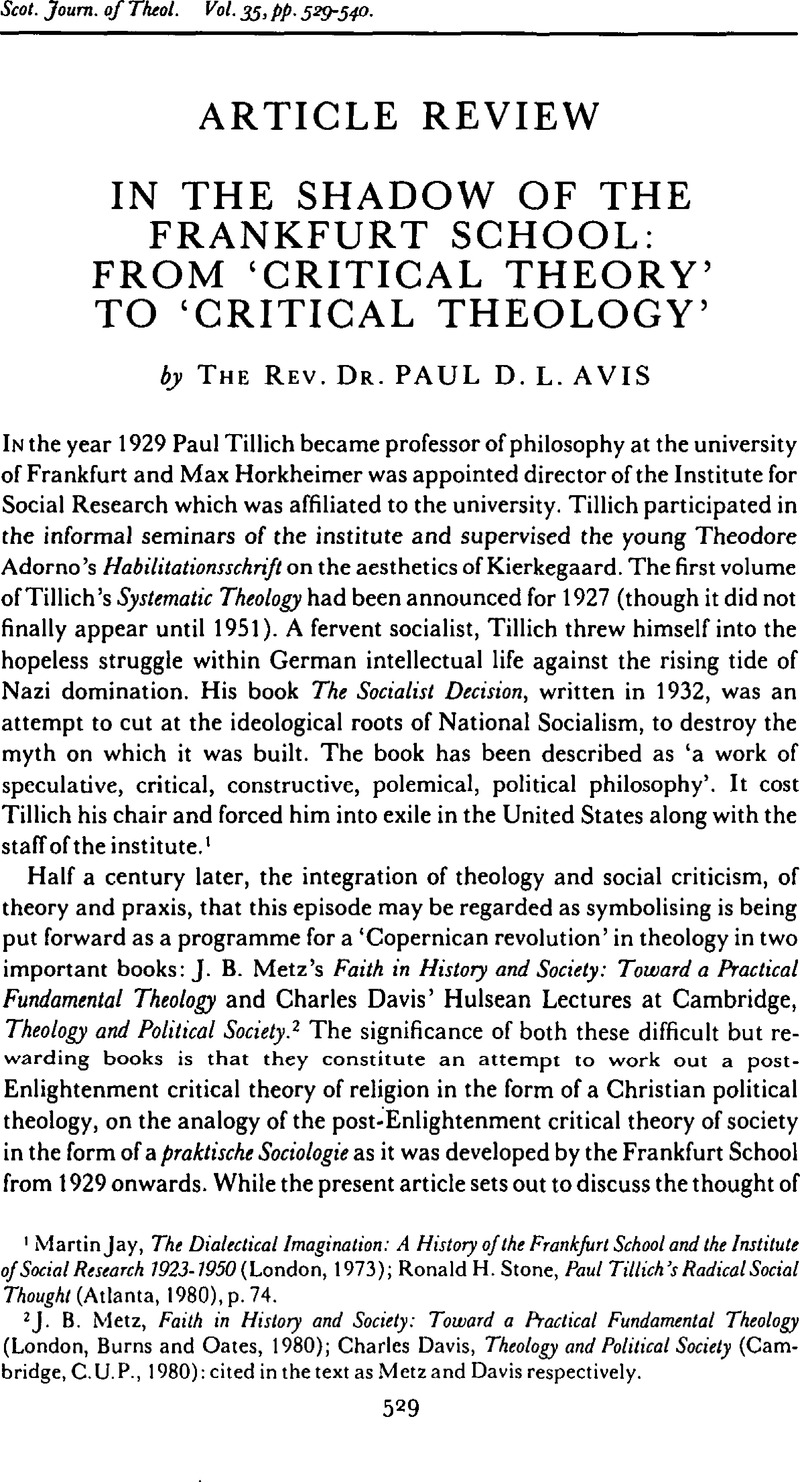No CrossRef data available.
Article contents
In the Shadow of the Frankfurt School: From ‘Critical Theory’ to ‘Critical Theology’
Published online by Cambridge University Press: 02 February 2009
Abstract

- Type
- Article Review
- Information
- Copyright
- Copyright © Scottish Journal of Theology Ltd 1982
References
1 Jay, Martin, The Dialectical Imagination: A History of the Frankfurt School and the Institute of Social Research 1923–1950 (London, 1973)Google Scholar; Stone, Ronald H., Paul Tillich's Radical Social Thought (Atlanta, 1980), p. 74.Google Scholar
2 Metz, J. B., Faith in History and Society: Toward a Practical Fundamental Theology (London, Burns and Oates, 1980)Google Scholar; Davis, Charles, Theology and Political Society (Cambridge, C.U.P., 1980)Google Scholar: cited in the text as Metz and Davis respectively.
3 Rahner, Karl, Theological Investigations I, 2nd edn (London, 1965), pp. 297–317Google Scholar; ibid. IV (London, 1966), pp. 165–188.
4 Ibid., IV, p. 187.
5 Metz, J. B., Theologyofthe World (London, 1969), pp. 20, 23f, 49, 51ff.Google Scholar
6 Cf. Rahner, , Foundations of Christian Faith: An Introduction to the Idea of Christianity (London, 1978), pp. 140–146Google Scholar; Hörer des Wortes (1941), chs 11 and 12, E.T. in McCool, Gerald, ed, A Rahner Reader (London, 1975).Google Scholar
7 Rahner, Hörer des Wortes, ch. 11.
8 Aquinas, , Summa Contra Gentiles, IV, 42Google Scholar. Cf. also Perrson, Per Erik, Sacra Doclrina: Reason and Revelation in Aquinas (Oxford, 1970)Google Scholar. For the influence of Hegel on Rahner, see Corduan, W., ‘Hegel in Rahner: a study in philosophical hermeneutics’, Harvard Theological Review, 71: 3–4 (1978), pp. 285–298.Google Scholar
9 Jay, op. cit., pp. 48f. For an early assessment of the Rahner-Metz relations see Mann, Peter, ‘The Transcendental or the Political Kingdom? Reflections on a theological dispute’, New Blackfriars, 50 (1969), pp. 805–812CrossRefGoogle Scholar; 51 (1970), pp. 4–16.
10 Jay, op. cit., p. 4; Habermas, J., Theory and Practice (London, 1974), pp. 41 ffGoogle Scholar; Kilminster, R., Praxis and Method (London, 1979)Google Scholar; Tillich, , Systematic Theology III (Welwyn, 1964), pp. 66 ff.Google Scholar
11 Jay, op. cit., p. 64.
12 Cf. Kirk, J. Andrew, Liberation Theology (London, 1979), pp. 36f., 41.Google Scholar
13 Jay, op. cit., 158, 279f.
14 Rahner, , Foundations of Christian Faith, p. 11.Google Scholar
15 Ibid., p. 8; Fries, H., ‘Fundamental Theology’, in Rahner, et al. , ed. Sacramentum Mumli (New York/London, 1968–1970), II.Google Scholar
16 J. B. Metz,‘Apologetics’, in ibid., I.
17 Metz's narrative theology seems to be independent of the work that has been done in this field in the United States (H. Frei) and in protestant German theology (D. Ritschl), but we notice that once again Metz seeks legitimation in the thought of Rahner whose method he describes as a concentrated and abbreviated biography [i.e., narrative] of human history in the presence of God (Metz, 227).
18 Rahner, , Foundations of Christian Faith, p. 320Google Scholar. There is an obvious connection with Rahner's epistemological concept of Vorgriff, anticipation, pre-apprehension, reaching out.
19 Here Metz is drawing directly on the thought of the Frankfurt School and reflecting the passion and anguish that has given it its significance for contemporary theology. Cf. Horkheimer, , The Eclipse of Reason (New York, 1947), p. 161Google Scholar: ‘The real individuals of our time are the martyrs who have gone through infernos of suffering and degradation in their resistance to conquest and oppression … the anonymous martyrs of the concentration camps are the symbols of the humanity that is striving to be born. The task of philosophy is to translate what they have done into language that will be heard, even though their finite voices have been silenced by tyranny.’
20 Moltmann, Metz et al. , Religion and Political Society (New York, etc. 1974), p. 188Google Scholar (E.T. of Kircheim Processder Aufklärung, 1970).
21 Cited Tar, Zoltán, The Frankfurt School (New York, 1977), p. 175.Google Scholar
22 Moltmann, has made the same claims: Religion and Political Society p. 19.Google Scholar
23 Ebeling, , The Study of Theology (London, 1979), p. 162Google Scholar. Cf. Pannenberg, , Theology and the Philosophy of Science (London, 1976)Google Scholar; Peukert, H., H‘issenschaflslheorie — Handlungs-theorie — fumtamentale Theologie (Düsseldorf, 1976)Google Scholar; Torrance, T. F. — most recently — The The Ground and Grammar of Theology (Belfast, 1980).Google Scholar




